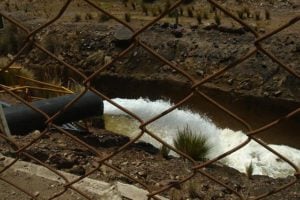wastewater
Environmental impact of animal waste
MADISON, WI MARCH 4, 2011 — North and South Carolina have seen a steady increase in swine production over the last 15 years. In North Carolina alone, swine production generates approximately a quarter of the state’s gross farm receipts. Th…
Effectiveness of wastewater treatment may be damaged during a severe flu pandemic
Existing plans for antiviral and antibiotic use during a severe influenza pandemic could reduce wastewater treatment efficiency prior to discharge into receiving rivers, resulting in water quality deterioration at drinking water abstraction points.
…
The green machine: Algae clean wastewater, convert to biodiesel
Let algae do the dirty work.
Researchers at Rochester Institute of Technology are developing biodiesel from microalgae grown in wastewater. The project is doubly “green” because algae consume nitrates and phosphates and reduce bacteria and toxins …
Igloo-shaped ‘Poo-Gloos’ eat sewage
SALT LAKE CITY, January 10, 2011 — Inexpensive igloo-shaped, pollution-eating devices nicknamed “Poo-Gloos” can clean up sewage just as effectively as multimillion-dollar treatment facilities for towns outgrowing their waste-treatment lagoons, a…
Filtering kitchen wastewater for plants
Water is a precious commodity, so finding ways to re-use waste water, especially in arid regions is essential to sustainability. Researchers in India have now carried out a study of various waste water filtration systems for kitchen waste water and …
Long-lasting chemicals threaten the environment and human health
Every hour, an enormous quantity and variety of manmade chemicals, having reached the end of their useful lifespan, flood into wastewater treatment plants. These large-scale processing facilities, however, are designed only to remove nutrients…
University of Minnesota engineering researcher finds new way to fight antibiotic-resistant bacteria
New findings by civil engineering researchers in the University of Minnesota’s College of Science and Engineering shows that treating municipal wastewater solids at higher temperatures may be an effective tool in the fight against antibiotic-resista…
Myth of a germ-free world: A closer look at antimicrobial products
Killing microorganisms has become a national obsession. A pair of antimicrobial compounds known as triclosan and triclocarban are lately the weapons of choice in our war of attrition against the microbial world. Both chemicals are found in an ar…
Algae for biofuels: Moving from promise to reality, but how fast?
A new report from the Energy Biosciences Institute (EBI) in Berkeley projects that development of cost-competitive algae biofuel production will require much more long-term research, development and demonstration. In the meantime, several non-fu…
UC research: Rabbit’s food brings luck in decreasing estrogen levels in wastewater
The November 2010 issue of “Environmental Pollution” details successful experiments at the University of Cincinnati wherein rabbit’s food resulted in the abiotic (non-biological) transformation and absorption of four different types of estrogen,…

